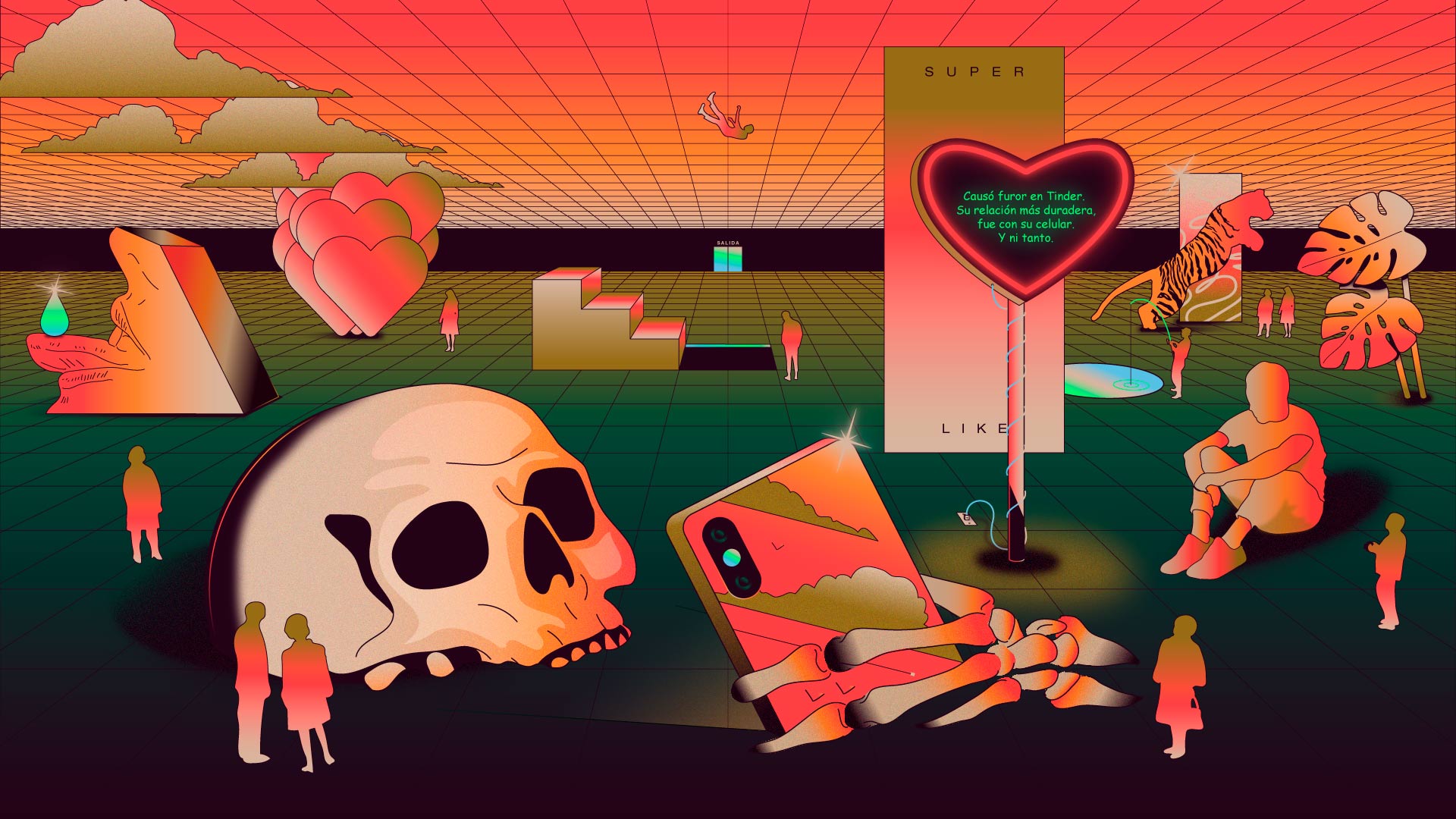[Más información sobre Futuros Aumentados]
En octubre de 2019, justo antes de que comenzara la pandemia, Tinder lanzó su primer contenido de entretenimiento llamado "Swipe Night". La pieza cuenta la historia de un grupo de amigos que pasan juntos las últimas horas antes de que un asteroide choque la Tierra. Cómo iban a saber desde la app que unos meses después el mundo se enfrentaría a nuevos virus, confinamientos, controles de movimientos e incluso control de citas para prevenir contagios.
No es raro que Tinder haya decidido cancelar su lanzamiento global en marzo de 2020. Después de todo, ¿quién quiere jugar con el Apocalipsis mientras vive el Apocalipsis diario y real?
Aunque la pandemia aún no ha terminado -especialmente en los países del llamado Sur Global-, Tinder decidió relanzar su producto de todos modos. Claro, hoy no hay nada más rentable que "la mercantilización del Apocalipsis" (lo digo en mi libro Después del Apocalipsis).
Y, como siempre, con la mercantilización viene la aceleración. La esencia de "Swipe Night" es la velocidad. Los usuarios tienen solo siete segundos para tomar cada decisión. Así que de la "mercantilización del Apocalipsis" pasamos a la mercantilización del deseo, es decir, a la "economía libidinal", a la economía impulsada por el deseo o la producción del deseo. En el siglo XX ese era un término que apenas usaban los filósofos franceses para describir el poder del capitalismo para liberar nuevas intensidades libidinales... al mismo tiempo que las mercantilizaban.
Hoy vemos cómo la economía libidinal impulsa la economía política.
El año pasado, cuando estalló la pandemia y la mitad del mundo entró en confinamientos y fuertes restricciones (el "distanciamiento social" marcó una distancia física pero significó más socialización que nunca), las app de citas como Tinder, Bumble y Paktor tuvieron un aluvión de descargas y participación. Podemos imaginarlo todo, incluso el fin del mundo, pero no el fin de la energía libidinal. Incluso si es solo digital. En realidad, vimos una rápida digitalización de las relaciones sociales, no solo de las citas.
Al mismo tiempo que esas aplicaciones tuvieron un nuevo Renacimiento, Zoom se convirtió en un nombre familiar para los que se quedaron en casa. El auge del "trabajo remoto”, el "aprendizaje a distancia", las "citas a distancia" y "todo a distancia" es la verdadera "nueva normalidad" de nuestra época. Y no hay nada "normal" en ello.
Lo que acelera esta transformación es una mayor desintegración de los derechos laborales y la desaparición de la tradicional diferencia entre lo público y lo privado que ya se estaba evaporando. Cuando todo es público ya nada es privado, y cuando ya nada es privado, incluso nuestros deseos más íntimos, el inconsciente mismo, se monetizan e incorporan a la máquina algorítmica en constante expansión.
La tecnología penetra profundamente en nuestros sectores de atención de la salud y se vuelve inseparable del sector financiero, no solo cuando se trata de negocios de Wall Street sino también de Bitcoin y el token no fungible reciente. Vivimos en lo que el filósofo italiano Franco "Bifo" Berardi llama "semiocapitalismo", una forma de capitalismo impulsada por la acumulación, la producción y la reproducción de signos. O como dijo el filósofo francés Pierre Klossowski, que influyó en Foucault, Deleuze y Lyotard, en su libro fundamental The Living Currency publicado en 1970, son las emociones y los signos los que se están convirtiendo en el factor económico fundamental.
Basta mirar Facebook, Instagram, Twitter y Tik Tok: todas se basan en compartir signos producidos por la economía libidinal (fotos, noticias, videos, mensajes), mientras que las compañías de Big Tech recopilan los datos y toman posesión de estos signos. En todo el mundo, las redes sociales están llevando a una capacidad de atención totalmente reducida, lo que permite la propagación viral de diversas teorías conspirativas y, la mayoría de las veces, permite que populistas o dictadores ambiciosos de derecha lleguen o permanezcan en el poder. Hoy ya no es suficiente apoderarse de los medios de producción, también tenemos que apoderarnos de los memes de la producción. Porque si vivimos en el semiocapitalismo, la lucha crucial ocurrirá en el espacio digital.
Eso no significa que las luchas materiales reales, incluido el trabajo duro y el enorme sufrimiento, vayan a desaparecer. Significa que los resultados de estas luchas ya dependen de la semiosis, es decir, de la producción de signos y de significado. Todos los que puedan comprender y utilizar los memes de producción también podrían apoderarse de los medios de producción. En otras palabas, si logramos salirnos de la trampa de la semiosis dominante que hoy representan Facebook o Instagram, Zoom o Amazon, este acto podría tener repercusiones reales también en las condiciones materiales.
Un buen ejemplo, aunque no es nada revolucionario, es cómo el esfuerzo coordinado de una multitud que usó Reddit a principios de 2021 logró crear una contracción corta (o estrangulamiento de posiciones cortas) de una compañía de videojuegos en declive llamada "GameStop" que produjo un aumento del 1,500 por ciento en el precio de sus acciones en dos semanas. Luego,, el magnate Elon Musk tuiteó "¡Gamestonk!" lo que provocó un salto en las operaciones fuera de horario. Entonces se creó un rápido cambio de significado en la semiosfera (Reddit y después Twitter), que tuvo efectos no solo en el mercado de valores sino también en la realidad material de la misma manera que la especulación financiera deja a las personas sin hogar ni trabajo.
Otro ejemplo, tomemos el valor récord de Bitcoin, que en la realidad material significa que cada vez más mineros usan más y más máquinas. Según un informe de la Universidad de Cambridge, Bitcoin consume más electricidad anual que toda Argentina. Y esa es quizás la mejor materializacion del "capitalismo verde": hoy se puede comprar un automóvil Tesla eléctrico en Bitcoin para volverse "verde", pero en realidad se está utilizando una criptomoneda que está contribuyendo en gran medida a la crisis climática a la que supuestamente se está "salvando".
Igual que con las Bitcoin, la tendencia más reciente de los NFT (activos tokens no fungibles) y artes digitales también tiene una huella de carbono masiva. Obviamente, se podría preguntar "¿Cómo es que alguien puede comprar un tweet?", pero al comprar un NFT no se está comprando un enlace a un archivo, se está comprando el valor del signo que se basa en la escasez digital. Y de nuevo volvemos al semiocapitalismo.
Todas las civilizaciones de la historia utilizaron, produjeron e interpretaron signos. Pero hoy, quizás por primera vez, la producción de signos puede llevar al fin a la especie humana que evolucionó al utilizar el lenguaje y los signos no solo para la comunicación, sino para la organización de la sociedad y la economía. Ya sea por el efecto de Bitcoin sobre el cambio climático o la posibilidad de que un signo mal interpretado cause la aniquilación nuclear, es obvio que nunca fueron tan poderosos como hoy. Porque lo que está en riesgo es la extinción, no solo de la especie humana, sino de otras especies y de la biosfera ... y de la semiosfera misma.
El problema es que hemos estado tan integrados en nuestra semiosfera contemporánea, que se hace difícil dar un "paso hacia afuera". No solo en el sentido de no usar la tecnología (o más bien usarla de manera diferente en beneficio de la humanidad y del planeta), sino en el sentido de "dar un paso adelante" mental para entender que estamos en una etapa de (semio) capitalismo que galopa hacia un gran desastre y un punto sin retorno.
La salida, mientras haya tiempo, si es que aún hay tiempo, radica en comprender los signos y la semiosis, todo lo que hacemos, sentimos, tememos, compramos, vendemos, producimos y reproducimos en la semiosfera del siglo XXI como nuestra "moneda viva" contemporánea que también puede producir un resultado diferente.
En vez del narcisismo de las redes sociales o la mercantilización del deseo, esto puede llevar a una cooperación planetaria sin precedentes para prevenir la crisis climática y desmantelar el sistema mundial basado en la explotación, extracción y expansión.
Quizás en lugar de conducir hacia la extinción, nuestra tecnología actual y nuestra etapa contemporánea de semiosis también podrían conducir no solo a una revolución, sino a un tipo de evolución.
Traducción: Leticia Vizzón
Versión en inglés:
Our brave new semiocapitalism
When back in October 2019, just before the pandemic, Tinder launched its first entertainment content called "Swipe Night", hardly could they know that only a few months later the world would be faced with a pandemic, lockdowns, control of movement - and even control of dating because all the "social distancing" and new social measures.
"Swipe Night" tells the story of a group of friends during the last few hours before an asteroid hits Earth. No wonder Tinder had to cancel its global launch in March 2020 specifically citing the apocalyptic theme and the Covid-pandemic. After all, who still wants to play with the Apocalypse in our real existing daily Apocalypse?
Although the pandemic is nearly not finished, especially in the countries of the so called Global South, Tinder has decided to relaunch its apocalyptic product anyway. Obviously there is nothing more profitable nowadays than, what I call (in my book After the Apocalypse), "the commodification of the Apocalypse".
And as, always, with commodification comes acceleration. The essence of "Swipe Night" is speeed. Users have only seven seconds to make each decision. So from the "commodification of the Apocalypse" we come back to the commodification of desire, namely to the "libidinal economy" - the economy that is driven by desire or the production of desire. In the 20th century it was a term mainly connected to French philosophers describing the power of capitalism to liberate - and at the same time commodify - new libidinal intensities.
Today we can see everywhere how the libidinal economy is driving the political economy.
Last year when the pandemic broke out and half of the world went into lockdowns and heavy social restrictions (so called "social distancing" which was in fact physical distance, but more socializing than ever), dating apps such as Tinder, Bumble and Paktor saw a surge of downloads and app engagement. We can obviously imagine everything, even the end of the world, but not the end of libidinal energy. Even if it's only digital. We can in fact see a rapid digitalization of all social relationships - not just dating.
At the same time when dating apps had a new Renaissance, Zoom became a household name for those stuck at home due to the COVID-19 pandemic. The rise of "remote work", "remote learning", "remote dating" and "remote everything" is the truly "new normal" of our age. And there is nothing "normal" in it.
What this transformation accelerates is the further disintegration of labor rights and erasure of the traditional difference between public and private which was already evaporating. When everything is public, nothing is private anymore, and when nothing is private anymore, even our innermost desires - the unconscious itself - become monetized and incorporated into the ever-expanding algorithmic machine.
At the same time, technology is penetrating deeper into our health care sectors (see how the Sillicon Valley company Palantir is fully taking over the NHS) and it became inseparable from the financial sector, not only when it comes to Wall Street trading but also to Bitcoin and the recent Non-fungible token. We live in what the Italian philosopher Franco "Bifo" Berardi calls "semio-capitalism", a form of capitalism that is being driven by the accumulation, production and reproduction of signs. Or as the French philosopher Pierre Klossowski - who influenced Foucault, Deleuze and Lyotard - put it in his seminal book The Living Currency published back in 1970, it is emotions and signs themselves which are becoming the fundamental economic factor.
It is sufficient to look at social networks from Facebook and Instagram to Twitter and Tik Tok, they are all based on sharing various signs produced by the libidinal economy (whether it is photos, news, videos, messages), while it is the Big Tech companies that harvest the data and own these signs. All over the world social media is leading to an utterly reduced attention span, enabling the viral spread of various conspiracy theories and more often than not - enabling ambitious right-wing populists or dictators to come to power or stay in power. Today it is obviously not enough anymore to just seize the means of production, we also have to seize the memes of production. Because if we live in semiocapitalism, the crucial fight will happen in the digital space.
That doesn't mean that the real material struggles, including hard work and enormous suffering, are simply going to vanish, it means that very often the outcomes of these struggles already depend on semiosis, namely the production of signs and the production of meaning. Those who will be able to understand and use the memes of production might as well be able to seize the means of production. In other words, if we are able to get out of the trap of the ruling semiosis which is today represented by Facebook or Instagram, Zoom or Amazon, this act could have real repercussions on the material conditions as well.
A good example - although it's nothing revolutionary - is how the coordinated effort of a crowd using Reddit in early 2021 succeded to create a short squeeze of a declining video game company called "GameStop" which resulted in a 1,500 percent increase in the company's share price over the course of two weeks. Then, of course, Elon Musk tweeted "Gamestonk!" triggering a jump in after-hours trading. So basically, a rapid change of meaning was created in the semiosphere (Reddit and later Twitter), which then had effects not only on the stock market, but also in the material reality in the same way financial speculation leaves people without homes or jobs.
Or take the record hitting value of Bitcoin. Which in the material reality means more and more miners to run more and more machines. According to a recent analysis by Cambridge University, Bitcoin already consumes more electricity annualy than the whole of Argentina. And that's perhaps the best embodiment of "Green Capitalism": today you can buy an electric Tesla car in Bitcoin in order to go "green", but in fact you are using a cryptocurrency that is heavily contributing to climate crisis... which you are supposedly "saving".
And just like Bitcoin, the most recent trend of NFTs (non-fungible tokens) and digital arts also has a massive carbon footprint. Of course, you might ask yourself "But how can someone buy a tweet?", but by buying an NFT you are not simply buying a link to a file, you are buying the sign value which is based on digital scarcity. And again we are back to semiocapitalism.
Of course, all civilisations in human history used, produced and interpreted signs, but today, perhaps for the first time, we are at a stage at which it is precisely the production of signs that can lead to the end of the human species that evolved to using language and signs not just for communication, but for the organisation of society and economy. Whether it is the effect of Bitcoin on climate change or the possibility that a wrongly interpreted sign might cause nuclear annihilation, it is obvious that signs were never so powerful as today. Because what is at stake is Extinction, not just of the human species, but extinction of other species and the biosphere... and semiosphere itself.
The problem is that we have been so much integrated into our contemporary semiosphere, that it is becoming difficult to take a "step out". Not just in the sense of not using technology (or rather using it differently for the benefit of all humanity and the planet), but in the sense of "stepping out" mentally in order to understand that we are at a stage of (semio)capitalism that is galloping into a major disaster and point of no return.
The way out of it, while there is still time - if there still is time - perhaps lies in understanding/using signs and semiosis - all what we do, feel, fear, buy, sell or date, produce and reproduce in the semiosphere of the 21st century - as our contemporary "living currency" that can also lead to a different outcome.
Instead of the narcissism of social networks or the commodification of desire, it can lead to unprecedented planetary cooperation to prevent climate crisis and dismantle the world system based on exploitation, extraction and expansion.
Perhaps instead of leading towards Extinction, our current technology and our contemporary stage of semiosis could also lead not just to a revolution, but a sort of evolution.



